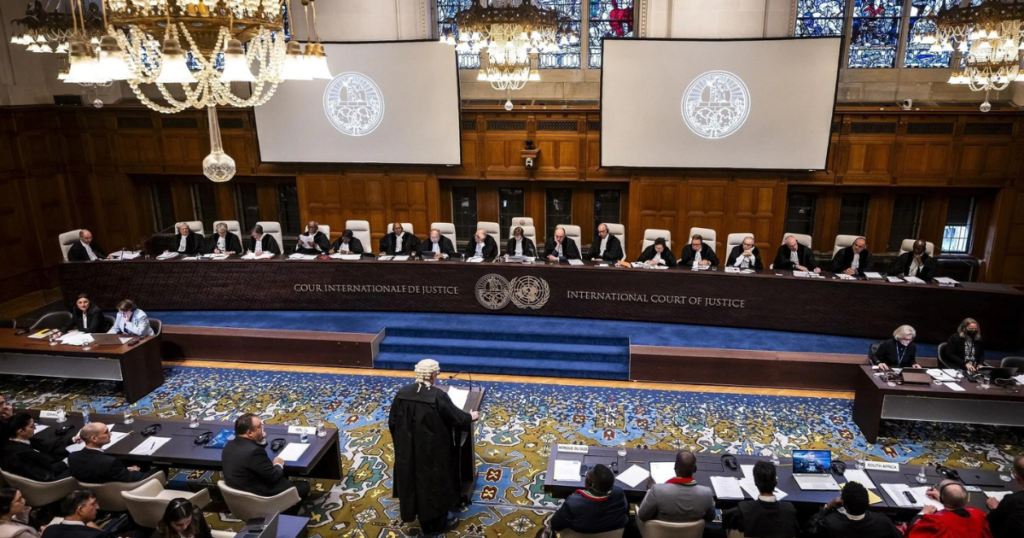At the start of a historic dispute, Nicaragua has asked the UN’s top court to stop Germany from selling arms to Israel. Germany is accused of violating the UN Genocide Convention by stopping payments to the UN organization that provides aid to Israel and the transfer of military equipment there. Berlin denies these allegations and wants to defend itself before the International Court of Justice (ICJ).
Die Vorwürfe
About 30% of Israel’s military equipment purchases in 2023, totaling 300 million euros (US$326 million; $257 million), came from Germany. Based on another case filed by South Africa in January, judges in The Hague ruled that Israel must take “all possible measures” to prevent crimes of genocide. In addition, the court ordered that Hamas immediately return all prisoners it kidnapped from Israel during its October 7 operations.
Israel has upheld its right to self-defense and rejected claims that it is committing genocide in Gaza. According to the Hamas-controlled Ministry of Health in Gaza, the Israeli attack left over 33,000 people dead, most of them civilians. According to Oxfam, 300,000 Palestinians stranded in the northern region of Gaza have survived on an average of 245 calories a day since January, putting them at risk of starvation. Nicaragua claims Germany is complicit in Israel’s alleged war crimes, as the country made $326.5 million in arms sales to Israel last year, a tenfold increase from 2022. The majority of sales were parts for communications and air defense systems.
Gerichtsverfahren
Germany was among fifteen Western countries that stopped funding the UN Relief and Works Agency for Palestine Refugees (UNWRA) because certain employees of the organization were accused of being involved in the attacks against Israel on October 7th. Documents submitted to the International Court of Justice indicate that Nicaragua is demanding that the United Nations World Court order Berlin to stop selling arms and resume supporting the humanitarian organization. This organization is one of the few foreign organizations still active in Gaza. It states that if such steps are not taken, “Germany is facilitating the commission of genocide and is failing in its obligation to do everything possible to prevent the commission of genocide.” Alain Pellet, representative of Nicaragua, said in the opening speech of the trial that it was “urgent that Germany stop further sales.” “Germany was and is aware of the risk that the weapons it has supplied and continues to supply to Israel will go to Israel,” he told the judges.
Germany’s defense
Although Berlin has denied the allegations, it did not disclose its legal intentions in advance of the proceedings. Government spokesman Wolfgang Büchner said: “We take note of Nicaragua’s lawsuit and reject the allegations as unfounded.” Israel’s right to self-defense was vigorously defended by Chancellor Olaf Scholz, but he encountered growing public resistance to the country’s ongoing military deliveries. In a letter to the German Chancellor, a group of government employees demanded that the government “stop arms supplies to the Israeli government with immediate effect.” Citing the International Court of Justice’s ruling in January, the statement said: “Israel is committing crimes in Gaza that are in clear contradiction to international law and therefore to the constitution to which we are bound as federal officials and civil servants.”
Internationale Reaktion
In the case filed in January, the ICJ found that “at least some of the acts and omissions alleged by South Africa to have been committed by Israel in Gaza appear to fall within the provisions of the Convention.” Those in the case have wasted no time in pointing out that Nicaragua has a spotty record on human rights and its government has been accused of suppressing dissent. President Daniel Ortega’s government was accused by Britain’s delegation to the United Nations in March of a “relentless” attack on civil liberties and human rights.
Just over six months have passed since the October 7 attack between Israel and Hamas. Hundreds of Israelis were held captive that day and more than 1,200 were killed. Israel has been promising a ground operation in neighboring Rafah for weeks. However, over 1.4 million people, more than half of Gaza’s population, live in the city. The United States, Israel’s strongest ally, has expressed concern about the possibility of the attack being exposed to a global audience. John Kirby, the White House national security spokesman, reiterated that the US opposed an attack in Rafah.
Abschluss
In summary, in Israel, where anti-government rallies have increased and discontent is growing over what some perceive as official reluctance to free the approximately 130 hostages held captive, the six-month deadline has been met with growing dissatisfaction. At a rally by the relatives of the hostages in front of the Knesset in Jerusalem, many thousands of demonstrators demanded a “now hostage deal”. Grieving family members gathered at the scene of the musical event on October 7 in southern Israel. Over 300 people died there.


